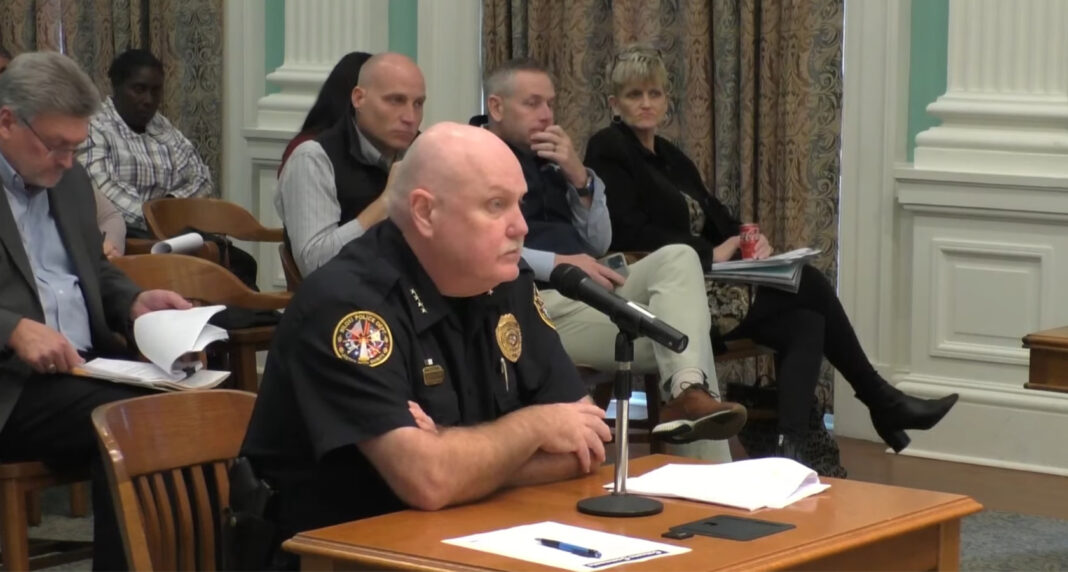(This is the first in a multi-part series see all parts of the saga here.)
Mississippi Insurance Commissioner Speaks Out on Uninsured Motorist Ticketing Program, Says ‘Follow the Money’
MISSISSIPPI GULF COAST — In a damning assessment of the automated ticketing program pushed by Ocean Springs City Attorney Robert Wilkinson to cities across the state, Mississippi Insurance Commissioner Mike Chaney has raised significant legal and ethical concerns about the operations of Securix and Securix Mississippi.
In an email to GC Wire, Chaney criticized the program’s use of sensitive state data, questioned its effectiveness, and called for transparency about its practices. The controversy surrounding Wilkinson and his partners has already embroiled cities like Ocean Springs and Biloxi in legal and ethical quagmires. Now, with a state official weighing in, the scrutiny is mounting.
A Questionable Use of Data
The program relies on accessing insurance data maintained by the state. As each car passes through the view of one of their cameras, it cross references the license plate with this data. If the system finds a vehicle does not match an active insurance policy, the company mails a citation to the vehicle’s owner, along with the threat of license suspension.
Chaney emphasized that state law allows the use of this data only for law enforcement purposes — not for profit-driven endeavors by private companies.
“The use of this data is supposed to be for law enforcement purposes only and not for use by private entities without expressed authority of the legislature,” Chaney stated. “I personally believe that Securix’s use of the data is a violation of state statutes.”
This raises serious questions about the legal foundation of Securix’s operations.
No Oversight, Flawed Software, and Potential for Abuse
Chaney’s email revealed a glaring oversight in the program: the lack of mechanisms to ensure the responsible use of the state insurance database. “I do not know of any compliance measures in place, and there are flaws in the software used to issue tickets/citations,” he stated. This absence of accountability opens the door to significant risks and potential misuse of sensitive data.
Without strong oversight, the data could be leveraged for purposes far beyond its intended use. For instance, private companies like Securix could theoretically cross-reference personal information to develop consumer profiles, sell data to third-party entities, or target individuals with predatory practices.
The flawed software Chaney referred to has already shown to result in a higher rate of erroneous citations and unfairly targeting certain groups based on incomplete or inaccurate information.
Privacy breaches, identity theft, or even discriminatory enforcement practices are all possibilities without proper protection of the data. The absence of oversight and clear guidelines to protect this data raises serious ethical and legal concerns about the program’s operations.
Ineffective Program — ‘Follow the Money’
Chaney also cast doubt on the program’s effectiveness in reducing the number of uninsured motorists, stating bluntly that the Mississippi Insurance Department “does not find the actions by Securix have reduced the number of uninsured motorists in the state by any meaningful number.”
The Commissioner also questioned the need for such a private entity to exist in the first place, explaining that the state already has the data to cross reference registered vehicles with the insurance database. “If the state wanted to issue tickets/citations for uninsured motorist, the Department of Public Safety could match the data and send out citations monthly for not having insurance, he said.”
Chaney ended his email with a direct challenge: “Follow the money.”
This sentiment emphasizes the profit-driven nature of the Securix business model, which relies on fines collected from motorists — with the bulk of those fines often going to the private company, rather than the municipalities they partner with.
Ripple Effects: Fallout in Ocean Springs and Biloxi
In Ocean Springs, the Securix controversy has become a flashpoint for debates over transparency, ethics, and accountability. City Attorney Robert Wilkinson’s alleged dual role — advising city officials on the Securix program while reportedly profiting from the deal — has drawn scrutiny from state ethics experts and residents alike.
The program collapsed under the weight of systemic flaws, including erroneous citations targeting insured motorists, and allegations that Wilkinson used his position to steer the city into a contract that personally benefited him. Despite these revelations, city officials have largely remained silent or dismissed the concerns, raising further questions about complicity and a culture of secrecy at City Hall.
In Biloxi, the Securix saga has taken a different turn, with officials quietly suspending the program without notifying the public. After promising the city council that all issues from Ocean Springs had been resolved, the same players rebranded as Securix Mississippi and secured the contract.
Within months, the program ground to a halt amidst reports of financial instability and internal legal battles within the company. Biloxi’s failure to inform residents of the suspension has sparked criticism, leaving many wondering why the city would enter such a contentious arrangement in the first place and why transparency remains elusive.
The Need for Accountability
The Securix saga continues to expose glaring issues in how private companies interact with public data and municipal contracts. With questions of legality, ethics, and effectiveness now raised at both local and state levels, the time for accountability is long overdue.
Whether the city governments involved will take steps to address these concerns or continue to protect the interests of colleagues remains to be seen.


